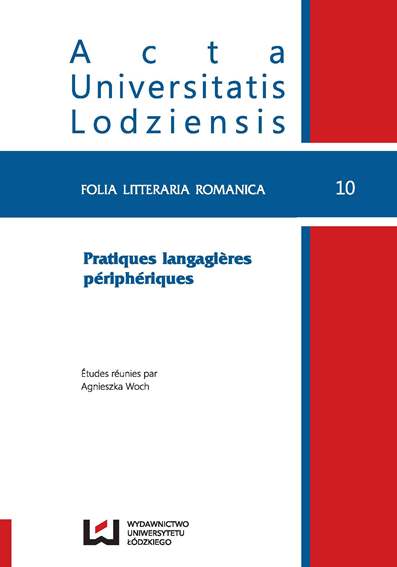The Use of Slang in Marcel Schwob’s Cœur double
DOI:
https://doi.org/10.18778/1505-9065.10.14Keywords:
Marcel Schwob, Cœur double, French slangAbstract
Cœur double was published by Marcel Schwob in 1891. The language of socially unprivileged classes contrasts noticeably with the poetic and refined French used in some passages of the volume. Between these two extremes, one also finds dialects, colloquialisms and, of course, the standard register often mixed with various examples of technical and specialist vocabulary. Some of the stories also contain an important amount of slang. It can be considered an integral part of the text forming the background and the milieu of the story but it can also be used to underline the contrast or modification. Slang also plays an important role in Cœur double as far as the identity is concerned. Thus the obvious connection exists between the character and the language he or she uses in the text. One also notes the constant use of standard (or even formal) French by the narrator as opposed to slang being used exclusively by certain characters. Finally, one should stress the importance of the cryptic function in various passages particularly rich in slang and its correlation with Schwob’s opinions concerning artificial origins of slang expressed in his Étude sur l’argot français.
Downloads
References
Calvet Louis-Jean, L’Argot, Paris, PUF, 1999
Google Scholar
Dauzat Albert, Les Argots. Caractères. Évolution. Influence, Paris, Librairie Delàgrave, 1929
Google Scholar
Goudaillier Jean-Pierre, « Argot et littérature : argot « mauvaise langue » ? », dans : Jean-Pierre Goudaillier, 25 ans d’écrits lexicographiques et argotologiques, éd. Andrzej Napieralski, Łódź, Wydawnictwo Uniwersytetu Łódzkiego, 2014, p. 231–244
Google Scholar
Guieysse Georges, Schwob Marcel, Étude sur l’argot français, Paris, Éditions du Boucher, 2003
Google Scholar
HugoVictor, Les Misérables, IVe partie, « L’Idylle rue Plumet et l’épopée rue Saint-Denis », New York, Charles Lassalle, Éditeur, 1862
Google Scholar
Larchey Lorédan, Dictionnaire historique d’argot, Paris, E. Dentu, 1880
Google Scholar
Rigaud Lucien, Dictionnaire d’argot moderne, Paris, Paul Ollendorff, 1888
Google Scholar
Rossignol Gustave-Armand, Dictionnaire d’Argot, Paris, Société d’Éditions Littéraires et Artistiques, 1901
Google Scholar
Schwob Marcel, OEuvres, (éd.) Sylvain Goudemare, Paris, Phébus Libretto, 2002
Google Scholar
Sue Eugène, Les Mystères de Paris, vol. I, Paris, J. Rouff et Cie, 1885
Google Scholar
Thomas Antoine, « L’argot ancien », dans : Journal des savants, 7e année, Octobre 1909, p. 437–445
Google Scholar
Thoveron Gabriel, Deux siècles de paralittératures. Lecture, sociologie, histoire, Liège, Éditions du Céfal, 2008
Google Scholar
Downloads
Published
How to Cite
Issue
Section
License
Copyright (c) 2015 Łukasz Szkopiński

This work is licensed under a Creative Commons Attribution-NonCommercial-NoDerivatives 4.0 International License.













